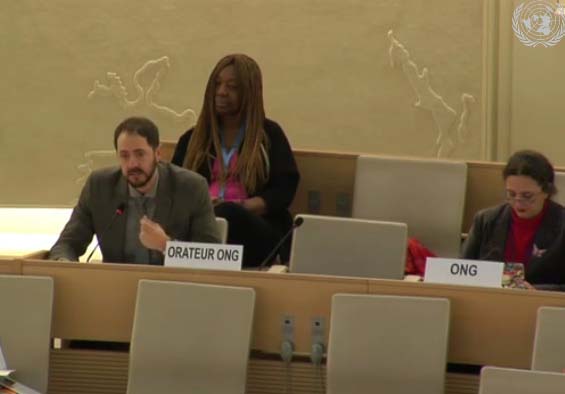 CESR's Niko Lusiani, Director of the Human Rights in Economic Policy Program, recently spoke to the UN Human Rights Council in support of the proposal by the UN Independent Expert on Debt and Human Rights to develop a set of Guiding Principles for assessing the human rights impacts of austerity and other economic reform policies.
CESR's Niko Lusiani, Director of the Human Rights in Economic Policy Program, recently spoke to the UN Human Rights Council in support of the proposal by the UN Independent Expert on Debt and Human Rights to develop a set of Guiding Principles for assessing the human rights impacts of austerity and other economic reform policies.
Video of his full address to the Council can be viewed here at 1:44:30 and the text is available below.
Niko also presented at a side event where he launched CESR’s new monitoring tool, Assessing Austerity.
Oral intervention by Nicholas Lusiani at the 37th Session of the UN Human Rights Council
Report of UN Independent Expert on Foreign Debt and Human Rights on the development of guiding principles for assessing the human rights impacts of economic reform policies (A/HRC/37/54)
February 28, 2018
I. Human rights consequences of fiscal consolidation and economic reforms
Almost ten years ago, the global economic crisis erupted, and quickly spread. In the name of fiscal discipline, governments in more than two-thirds of countries throughout the world have chosen to effectively disinvest in human rights by enacting sweeping and largely unnecessary and unjustified austerity measures.
As the UN Independent Expert on Foreign Debt and Human Rights, other independent human rights bodies and civil society organizations such as my organization (CESR) have consistently shown, many fiscal adjustment and other economic reform measures over the past decade have undermined human rights of all types—from the rights to education, food, health and housing to the rights to decent work, fair wages and social security; from freedom of expression to the rights to life and personal security. These blunt, blind and burdensome adjustment measures have aggravated disparities in income, gender, race, age, disability and migration status, amongst others. And austerity measures have largely failed their own aims, by disrupting economic demand and preventing a more buoyant, inclusive and sustainable economic recovery.
History shows that another recession is always right around the corner; like a natural disaster, it is entirely predictable that economic downturns will reoccur. Whether the next is transformed into another outright crisis for human rights and equality depends on the information governments have, and the policies they decide to enact.
II. Current challenges, and role the GPs can play
We, among a groundswell of organizations around the world, welcome and support the UN Independent Expert’s analysis and proposal to develop a set of Guiding Principles for assessing the human rights impact of economic reforms. And we do so because they can help overcome three key challenges to safeguarding human rights in times of economic distress.
First, HRIAs—if designed right—can provide real-time facts and forecasts for evidence-based policymaking—as recent practice by the UK Equality and Human Rights Commission and my own organization’s work has shown. These HRIAs will be essential providing a much more holistic and coherent “whole-person” perspective to understanding cumulative and wide- reaching human rights risks—helping to clarify who bears the burden and benefit, and therefore amplify the nature of the trade-offs and the choices involved in any proposed economic reform.
Second, we’ve seen in practice how governments lack practical guidance on how precisely to apply their existing human rights duties to the tough dilemmas inherent in the actual practice of economic policy-making. The process of articulating guiding principles to conduct HRIAs opens a unique opportunity to develop a more consolidated and shared understanding of how human rights norms apply to fiscal adjustments, and thereby how these can be better operationalized into monitoring and policymaking.
Third, independent and periodic HRIAs can be important vehicles for strengthening the transparency, participation and accountability of economic decision-making—identifying economic conduct putting human rights at harm, drawing attention to policy proposals posing foreseeable risks before they occur, and providing an opportunity for rightsholders to help shape a realistic roadmap for policy alternatives to prevent the need for austerity altogether.
We believe another Lost Decade for Human Rights is avoidable. We urge governments to support the Independent Expert’s Guiding Principles proposal—and to support all his future country visits—as key steps toward that aim. Thank you.